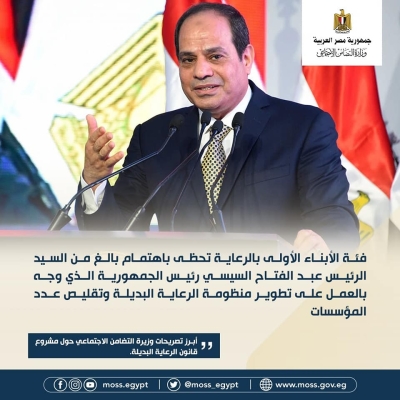Media Center - News
Social Solidarity launches the first community dialogue on the alternative care bill
News Details
Feb 16, 2022
Yasser Badry Under the patronage and presence of Mrs. Nevin Al -Kabbaj, Minister of Social Solidarity, the Ministry launched the first community dialogue on the alternative care bill, in the presence of Mr. Jeremy Hopkins, representative of UNICEF in Egypt, Dr. Talaat Abdel Qawi, President of the General Union of NGOs, and more than 22 NGOs in the social welfare sector, representatives of the House of Representatives and the Sheikhs, representatives of Al -Azhar, and a number of families The calamity, in addition to the representation of the sons of Egypt in the role of social welfare. The Minister of Social Solidarity emphasized that the category of the first children with care is receiving great attention from President Abdel -Fattah El -Sisi, President of the Republic, who directed the development of the alternative care system and reduce the number of institutions, believing that the family environment is the best to raise children in order to ensure the achievement of psychological and emotional stability, in addition to the integration of services provided to them, whether from alternative families and government agencies and all relevant institutions, and therefore the state is heading Towards the "touch". Al -Kabbaj added that the ministry is working hard to crystallize the reform of the alternative care system through several main axes, the first of which was the development of a national strategy for alternative care that was launched during the year 2021, and the second of these axes is to find a comprehensive legislative bond represented in preparing the alternative care bill, which was prepared with the participation of some institutions of the civil society working in this field. The law focuses on finding new alternatives to the alternative care system with the aim of achieving the best interest of children, as well as defining the general framework of this system to ensure the organization of the efforts of the actors and direct their budgets in an integrated manner in a way that serves the achievement of the general goals of the strategy to achieve the best benefit from the available resources, whether governmental or for civil and civil society organizations or the private sector. Al -Kabbaj explained that the draft law aimed to prepare it to be an umbrella to develop this system, in addition to finding a unified legislative reference to be based on it by those in charge of the application of the alternative care system, limiting the separation of children from their biological and extended families and achieving the best interest of children, and the law also highlights the entitlement of children to the benefits of beneficiaries of the alternative care system and care providers to face all the challenges facing them, An example of this is to provide adequate housing, decent education, health care, a source of regular monthly expenses, and a job opportunity. The spirit of the law focuses on supporting the Egyptian family entity and early interference with natural families that extend to dealing with family problems before the development of differences to the limit of separation or divorce, with the importance of focusing on integrating children with their families, in addition to achieving the complementarity of the care system and taking into account the gradual proposal of alternative care systems so that family care is at the top of this gradual and institutional care the last response line. The law also focuses on developing response systems that address each stage of the child's age and care stages, starting from the birth stage to the age of 18 years when the transformation of subsequent care and to the full independence after the expiration of the subsequent care period, in addition to the necessity of transferring the responsibility of supporting the alternative care system from a responsibility at the level of one ministerial port to a responsibility that falls on all other ministries of the country, and put clear texts to organize the mechanisms of cooperation with other ministries in All stages of care.
